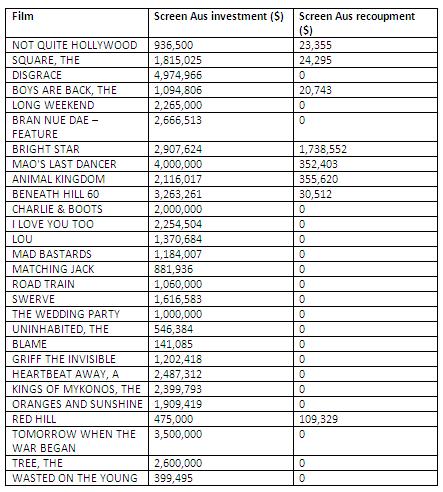Screen Australia has recouped less than 5 per cent of its $7.5 million production investment in the two top grossing local features of the past two years: Mao’s Last Dancer and Tomorrow, When the War Began.
The result, revealed in the Senate after a question on notice from Liberal Senator Simon Birmingham, shows the precarious nature of feature film recoupment.
The $25 million dance epic Mao’s Last Dancer grossed more than $15.4 million in 2009 and more than $US4.8 million in the US. It also topped Australian DVD sales in 2010, selling more than 100,000 copies. Screen Australia has received $352,403 back from its initial $4 million investment.
Meanwhile, the national agency has yet to receive a return on its initial $3.5 million investment in the $27 million thriller Tomorrow, When the War Began. The film grossed more than $13.4 million in Australia in 2010 and a sequel is planned for later this year.
A Screen Australia spokeswoman said the individual financing structure of each film is different, which affects returns.
Private investors typically receive returns before Screen Australia while investment returns typically take several years as a film is sold in different markets and formats. Sales agents and distributor advances are recouped before investors receive returns, as are commissions and expenses.
Nonetheless, the difficulty in delivering returns to private investors has spurred some producers to look at alternative distribution models, such as Instinct Entertainment’s David Redman.
His latest film, the animated Little Johnny The Movie, is being distributed online as well as through Greater Union cinemas during the Melbourne International Comedy Festival, ahead of a national tour.
The decision was spurred by the disappointing returns posted by comedy Charlie & Boots, which grossed almost $3.9 million and sold more than 130,000 DVDs. (Screen Australia has received no return on its $2 million investment in the $8 million film.)
The Screen Australia table does not include some recent releases, such as Samson and Delilah, and also includes some films which have not yet been released to the public, such as Swerve.
Screen Australia’s most successful recent investment was TV series Underbelly. It returned almost 90 per cent of its $2.93 million production investment.
Source: Screen Australia, Senate Estimate hearings.



